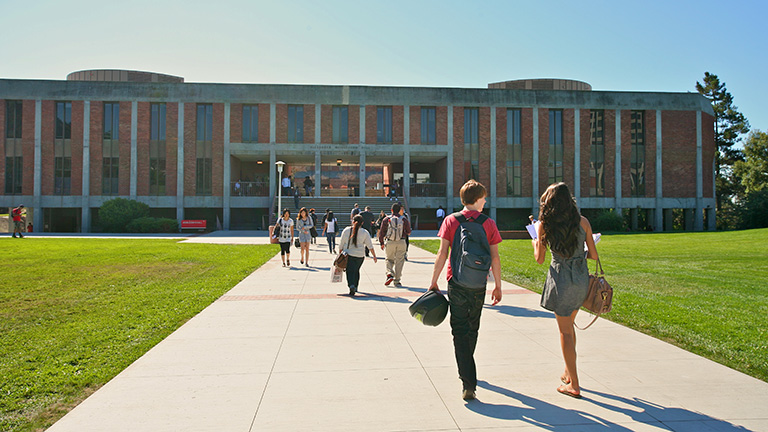CSUEB Faculty and Staff Complain of Bias in Departments
Lack of action from the Administration to affect diversity, equity, and inclusion.
California State University, East Bay prides itself on catering to a significantly diverse student body, with nearly 40% of undergraduate students identifying as Latinx and more than 60% identifying as women. This is a massive undertaking considering most schools cannot make these same claims. Yet, CSUEB’s faculty and staff do not match this same level of diversity. More than half of CSUEB’s faculty identify as white.
Throughout the academic setting, it is well known that implicit bias may play a role in how individuals get promoted. From a student perspective, we see this on display as the percentage of white students increases by 10% from undergrad to graduate students while all others drop.
Dr. Nazzy Pakpour, a former professor at CSUEB in the Department of Biology, explained where some of the issues at East Bay lie.
Centered around advancement, in particular, the greatest problem seems to be that there is no clearly defined rubric for how advancement is determined. Academic freedom allows each department to govern itself with the ability to ignore advice and recommendation from the administration if they choose.
This grants positives and negatives; on the one hand, this allows faculty to teach without fear of persecution and develop ideas with communal learning within the field; on the other, this means that professors feel that they can say what they often want, as was the case twice at East Bay in recent memory, and that implicit biases end up becoming permanent in their fields. This is well known to exist as many in academia are predominately white.
Pakpour went on to say that “women often have to prove success, while men can prove potential” to be advanced. This is an implicit gendered bias, rather than a racial one, covered by The Pioneer before.
She also explained the concept of cultural taxation and how this greatly affects faculty of color. Cultural taxation is defined as the extra work faculty, and staff of color takes on by being the ethnic representation on university committees and serving as unofficial diversity consultants.
This is a huge problem, particularly during her time in the biology department, as it was only through the demonstration of research that faculty could advance or gain tenure, according to Pakpour.
Kimberly Baker-Flowers, the former Diversity Officer for CSUEB, was able to clarify some points about the operation behind the scenes at East Bay. Baker-Flowers’ responsibility as the Diversity Officer was to establish a “culture of belonging” and focus on equity and inclusion.
She echoed Pakpour’s statements surrounding the fact that departments consider their own standards of achievement and added that “some departments are more supportive than others.” This means that ‘tenured faculty decide tenure,’ so any implicit bias that these bodies may have become inherent in the field. Now, without any levels of oversight, there can not be equity, and therefore the problems surrounding equity will only exacerbate.
She said the only way for this to change, without deteriorating the extremely important if oft misused academic freedom, is for the faculty to change. This, however, is difficult if more diverse individuals are biased against it.
She also added that more than twenty black staff members have left CSUEB in the last nine months, and this has not been deemed an issue by the Academic Senate. Baker-Flowers explains that she believed several factors have likely led to this, including the pandemic, high pressure, high levels of stress, non-competitive wages for the area, and so on.
Regarding the Academic Senate, Dr. Christina Chin-Newman, the Vice-Chair of the Senate and the Diversity and Equity Liaison Officer, has said that these issues addressed by both Baker-Flowers and Pakpour are real issues that the administration is generally ignoring.
After a request by the African Ancestry Faculty and Staff Association to perform an audit of salary based on race and gender was denied by the then Vice President of Administration and Finance and CFO, Debbie Chow, Chin-Newman then attempted to initiate her own audit. This audit was also denied by the Interim Vice President of Administration and Finance and CFO, Andre Johnson, and she was “given the runaround” regarding how this request would need to be filed.
Chin-Newman also addressed a number of issues surrounding how CSUEB addresses anti-blackness and racism from an administrative perspective.
When Baker-Flowers gave her advanced notice of leaving the school, President Sandeen emailed faculty and staff, stating that she would find a new Diversity Officer before her departure. However, Baker-Flowers left officially in February 2022, and as of April 2022, there is not only no Diversity Officer to take over the responsibility, but many of the responsibilities have been ignored and subsequently left to languish. There has been no interim Diversity Officer at this time either. Chin-Newman expressed that this makes her and other faculty feel that the “university does not value diversity and inclusion as much as it says it does.” It also seems as if “President Sandeen sees no need to have a Diversity Officer, and does not want to prioritize staff concerns since there are no systemic moves to help address staff concerns.”
The Diversity Office also seems to be having responsibilities slowly not provided to it, as the Student Success Centers have not been placed under the care of the Diversity Office but instead under Student Affairs. This ignores the fact that a diverse faculty and staff is important for the overall feeling of inclusion by students of color. One of the primary responsibilities of the Diversity Office is to oversee the Diversity Inclusion and Student Center, the DISC. All of the current DISC Faculty Fellows are women of color, yet there is an overall feeling of being ignored by the administration and a lack of recognition, particularly following Women’s History Month.
When the campus was reopened, and some faculty were able to continue teaching remotely, staff were required to come on to campus. This, coupled with a lack of feeling of appreciation by the administration, may have been some of the main stressors that have caused so many staff to leave.
Chin-Newman was also a member of a special subcommittee designed to address anti-blackness on campus systematically. However, the recommendations provided by this committee were “whitewashed.” In the original recommendation, intersectionality was defined, special language for racial groups was included, and other important aspects were all included and subsequently removed by the Cabinet of President Sandeen. Included was the question of attempting to address why Black students are underrepresented at CSUEB and in the CSU system as a whole, plus a plan to recruit more Black students, yet this was also removed.
Chin-Newman also believes that “President Sandeen needs a public response to these issues, but whitewashing recommendations from this subcommittee brings up the question ‘what does this say about removing [anti-blackness]?’”
When asked about the large number of Black faculty and staff that have resigned in the past few months, Chin-Newman said she believes it to be demoralizing for them because “every time someone resigns, nothing is being done.”
The My Story, My Truth Climate Assessment showed that Black faculty and staff are the most likely to report racism and bias against them, yet President Sandeen seems to be dragging her feet surrounding equity and inclusion, particularly for Chin-Newman, “her ignoring is problematic.”
There has been a push to hire more diverse faculty and staff on campus, headed by the Faculty Diversity Fellows Program; there are currently four diversity fellows as part of a pilot program, with two more to be hired; however, this has been mostly ignored by the President and not placed high as a priority.












